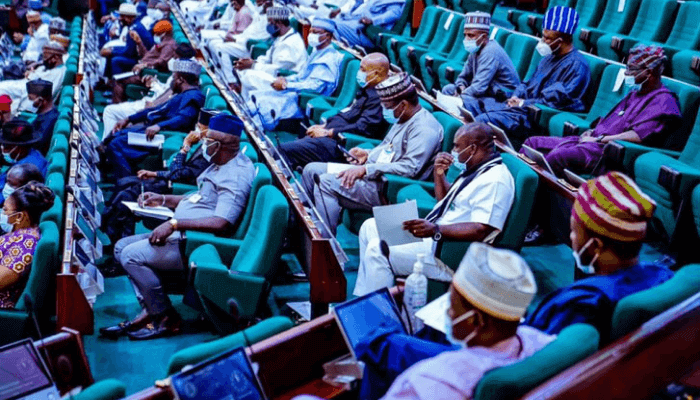The establishment of the National Assembly Service Pensions Board and exemption of its staff from the country’s Contributory Pension (CPS) have been faulted by stakeholders as capable of derailing the achievements and eroding confidence in the scheme.
The National Assembly Pension Service Board (Establishment ) Act 2023 signed into law by former President Muhammadu Buhari less than 24 hours before his exit from Aso Rock, according to them, did not follow due legislative process and economic realities in line with budgeting.
The National Assembly Service Pensions Board (Establishment) Act establishes the National Assembly Service Pensions Board to administer the pension scheme for personnel of the Service and exempts the personnel of the National Assembly Service from the CPS.
Details of the Act seen by BusinessDay reveals that retirement package for National Assembly staff is 500 percent of annual net emolument paid at commencement of terminal leave.
There will also be a 300 percent of annual gross emolument as gratuity paid on the last day of exit, while 50 percent of annual net emolument shall be paid as medical allowance yearly.
According to the document, a retiring staff shall also get repatriation of traveling allowance to include 50 percent of net emolument, air tickets for officer, spouse and four children at prevailing rates as well as baggage allowance.
The Act also applies to all personnel of the service including those who had retired before the commencement of the Act.
The Act also provides that the board will have a CEO and chairman, who will be former clerks of the National Assembly, while other members are retired clerks and staff.
The President of the Senate and Speaker of the House of Representatives will constitute the Board, and pension will be directly sourced from the consolidated revenue account of the federation.
Oguche Agudah, chief executive officer of Pension Fund Operators Association of Nigeria (PenOp), reacting to the Act signed by Buhari, said: “It beats us that the 9th Assembly had eight years to deliberate on this bill but had to wait till the last minute to pass this bill.”
Oguche said: “Recall that we had issued public statements earlier in the year when we got wind of this bill. We had cautioned the President against assenting to this bill because it did not follow due process. There was no public hearing, no input from critical stakeholders, no engagement with relevant agencies and authorities.
“This speaks to the height of abuse of legislative processes to serve personal interests and it must be condemned.”
According to him, when you look at the contents of the bill, it even buttresses the insincerity and self-seeking motives of the bill. “The board consists of retired clerks and deputies of the National Assembly who will be appointed by the Senate president and speaker of the House. There is no governance process or commitment to sound management principles.”
“We have said it previously that the process was flawed and speaks of abuse of legislative processes for narrow interests without thinking about the generality of Nigerians or the system as a whole,” he noted.
PenOp had stated unequivocally that the passage of this bill sets a dangerous precedent that will not augur well for hardworking Nigerians, working across the private and public sector, who depend on the CPS for retirement security and stability.
Ivor Takor, director of Centre for Pension Right Advocacy, said Buhari’s assent to the bill ran contrary to the position his administration had taken throughout his tenure. “It can be seen as a parting gift to federal legislators for their cooperation during his tenure.”
He said members of NASS, for reasons best known to them, had been at the forefront of sponsoring private members bills to exempt certain categories of public servants from the CPS.
He said: “There is a relationship between members of the National Assembly and personnel of the National Assembly Commission, which serves both chambers of the parliament. One should therefore not grudge members if they take interest in the welfare of staff and pensioners of the National Assembly. In doing so, they should at all times bear in mind that they are elected to make laws for the public interest and not their narrow interest, which smacks of nepotism in law making.
“Parliament is a deliberative assembly of one nation, with one interest, that of the whole. Local prejudices ought not to guide parliamentarians, but the general good, resulting from the whole.
“Former President Buhari’s government through administrative fiats also exempted The Head of Service of the Federation, Permanent Secretaries as well as the Accountant General of the Federation from the CPS without following due process. The Pension Reform Act 2014 ought to be amended to exempt these categories of public servants as in the instant case of personnel of the National Assembly.”
Takor therefore urged the present administration and the incoming National Assembly to put a stop to the negative vibes that the previous government and National Assembly threw into the pension industry with all the exemptions.
“If they believe that the CPS is not good for workers and is not in the interest of both the federal and states governments, then they should be bold enough to repeal the Pension Reform Act 2014 and dismantle all institutions associated with the law and let the country return to the pre Pension Reform period,” he said.
Peter Adedeji, managing director of Pension Scope, reacting to the bill, said it was a rude shock for him that the National Assembly who made the Pension Reform Act could exempt their staff and begin to go back to a budget funded pension arrangement.
Read also: Pension assets threatened as National Assembly workers exits contributory scheme
According to him, this is likened to someone building a house and coming back to remove the blocks one after the other, which means the building will collapse soon.
“For me, it’s a bad one for the Contributory Pension Scheme. The police are agitating to leave, the paramilitary agitating to leave, the military left and now the National Assembly staff. Does it mean that the legislators did not carry the government representatives, the National Pension Commission along before they decided to exit?” he queried.
Adedeji said it is a loss of confidence, and it will not be a surprise tomorrow to see a private sector institution begin to also ask for exit since the National Assembly that made the law could decide to exempt its staff from a scheme that has worked well.






